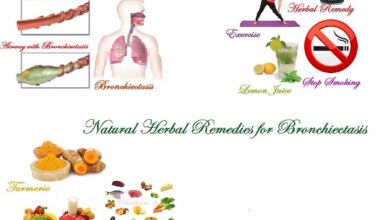Bronchiectasis Relief: The Top Home Remedies You Need Today

Bronchiectasis is a chronic condition characterized by the permanent enlargement of parts of the airways of the lung. This condition leads to a buildup of mucus, which makes the lungs more susceptible to infections. Managing bronchiectasis involves both medical treatments and lifestyle adjustments. For those seeking a more holistic approach, incorporating natural treatment for bronchiectasis can be highly beneficial. We explore various home remedies that can help alleviate the symptoms and improve the quality of life for individuals with bronchiectasis.
Understanding Bronchiectasis
Before diving into natural remedies, it’s essential to understand the condition itself. Bronchiectasis can result from infections, immune system deficiencies, or underlying conditions such as cystic fibrosis. Symptoms typically include chronic cough, production of large amounts of sputum, and frequent lung infections. While medical treatments like antibiotics, bronchodilators, and physiotherapy are common, natural treatments can complement these methods effectively.
Top Natural Treatments for Bronchiectasis
1. Hydration
Staying well-hydrated is crucial for individuals with bronchiectasis. Proper hydration helps thin mucus, making it easier to expel and reducing the risk of infection. Aim to drink at least 8-10 glasses of water daily. Herbal teas and broths can also be beneficial, especially those with anti-inflammatory properties like ginger or turmeric tea.
Related Articles: 9 Natural Treatment for Bronchiectasis
2. Steam Inhalation
Steam inhalation is a simple and effective way to relieve congestion and ease breathing. The warm, moist air helps loosen mucus, making it easier to cough up. To enhance the benefits, consider adding essential oils like eucalyptus or peppermint, known for their decongestant and antibacterial properties.
How to do it:
- Boil water and pour it into a bowl.
- Add a few drops of essential oil.
- Lean over the bowl, cover your head with a towel, and inhale the steam for 10-15 minutes.
3. Chest Physiotherapy (CPT)
Chest physiotherapy involves physical techniques to help clear mucus from the lungs. Techniques include clapping on the chest, known as percussion, and using gravity to assist mucus drainage (postural drainage). While these can be performed by a healthcare provider, learning to do them at home can be invaluable for daily mucus clearance.
Related Articles: Taking Control of Bronchiectasis with Herbal Medicines
4. Dietary Adjustments
A healthy, balanced diet plays a crucial role in managing bronchiectasis. Foods rich in antioxidants and anti-inflammatory properties can help reduce lung inflammation and boost the immune system.
Key foods to include:
- Fruits and Vegetables: High in vitamins and antioxidants. Berries, oranges, spinach, and kale are particularly beneficial.
- Omega-3 Fatty Acids: Found in fish like salmon and flaxseeds, these help reduce inflammation.
- Probiotics: Yogurt, kefir, and fermented foods support gut health, which is linked to overall immune function.
Avoiding processed foods, sugary drinks, and excessive dairy (which can increase mucus production) is also advisable.
5. Herbal Remedies
Several herbs have been traditionally used to support respiratory health and can be included in a natural treatment plan for bronchiectasis.
Related Articles: Best Sleeping Position for Bronchiectasis: Improve Your Breathing and Comfort
Notable herbs:
- Licorice Root: Known for its anti-inflammatory and expectorant properties, licorice root can soothe irritated airways and help clear mucus.
- Thyme: Acts as a natural antimicrobial and expectorant, making it easier to expel mucus.
- Oregano: Rich in antioxidants and possesses antibacterial properties. Oregano oil, in particular, can be used as a supplement or added to steam inhalations.
6. Breathing Exercises
Practicing breathing exercises can help improve lung function and reduce breathlessness. Techniques such as diaphragmatic breathing and pursed-lip breathing strengthen the respiratory muscles and enhance oxygen intake.
Diaphragmatic Breathing:
- Sit or lie down in a comfortable position.
- Place one hand on your chest and the other on your abdomen.
- Breathe in deeply through your nose, ensuring your diaphragm (not your chest) rises.
- Exhale slowly through pursed lips.
7. Physical Activity
Regular physical activity can help improve overall lung function and reduce mucus buildup. Activities like walking, swimming, or yoga can enhance cardiovascular fitness and respiratory efficiency. Always consult with a healthcare provider before starting a new exercise regimen, especially if you have severe symptoms.
8. Humidifiers
Using a humidifier can maintain moisture in the air, which helps keep the airways moist and reduces irritation. This is particularly beneficial in dry climates or during winter months when indoor air can become very dry.
Related Articles: New Treatments for Bronchiectasis: Hope for a Better Life
9. Honey and Warm Water
Honey is known for its soothing and antibacterial properties. Drinking a glass of warm water with a tablespoon of honey can help soothe the throat, reduce coughing, and provide a natural boost to the immune system.
10. Avoiding Respiratory Irritants
Minimizing exposure to pollutants, smoke, and other respiratory irritants is crucial for managing bronchiectasis. Use air purifiers at home to filter out allergens and pollutants, and avoid smoking or exposure to secondhand smoke.
Additional Tips for Managing Bronchiectasis Naturally
- Regular Check-ups: Regular medical check-ups ensure that the condition is monitored and managed effectively.
- Vaccinations: Keeping up-to-date with vaccinations like the flu shot and pneumococcal vaccine can prevent infections that may exacerbate bronchiectasis.
- Rest and Stress Management: Adequate rest and stress management techniques such as meditation or deep breathing exercises can support overall health and well-being.
Conclusion
While bronchiectasis is a chronic condition that requires medical oversight, incorporating natural treatment for bronchiectasis can significantly enhance the management of symptoms and improve quality of life. By staying hydrated, using steam inhalation, practicing breathing exercises, and embracing a healthy diet rich in anti-inflammatory foods and herbs, individuals can find relief and lead healthier lives. Always consult with a healthcare provider before starting any new treatment to ensure it’s safe and appropriate for your specific condition.




